End game: The rise of e-sport empires in Thailand and their armies of addicts
The competitive aspect of video gaming, known as e-sports, has surged in popularity. While it offers lucrative opportunities for some, there is a dark side to this leisure pursuit: Addiction.
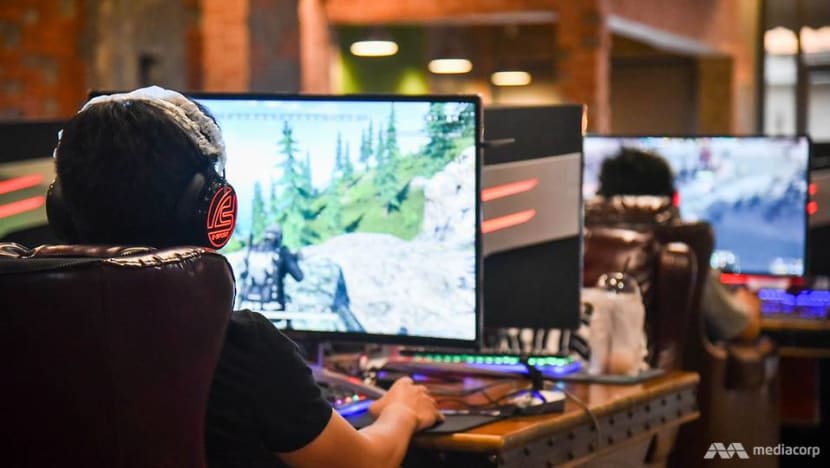
Experts say there could be more than 100,000 children addicted to video games in Thailand. (Photo: Jack Board)
BANGKOK: As darkness falls, the screens are lighting up. The teams assemble and commands are issued. Armies move, guns load, battles commence.
Inside this Bangkok gaming cafe, called G-Speed Living Plus, evenings are a busy time. Students still in school uniform shout instructions at others through headsets. Older gamers file in after work or university, slipping into reclining chairs and powering up to compete with friends and foes across the globe.
This is a place for serious players and is kitted out with high-performance terminals and stadium platforms custom-designed for tournaments.
“I call it Internet Cafe 4.0,” says Kriangsak Kaskrathok, G-Speed’s 40-year-old owner. He once ran smaller, conventional internet cafes, but gamers these days have certain demands and he is here to meet them.
The rising popularity of premium gaming arenas like this is evidence of the evolution of video gaming, an industry that generated about US$135 billion last year. The competitive aspect of gaming, known as e-sports, has surged in popularity, giving budding gamers a pathway to professionalism, enticed by the lure of cash prizes and online stardom.
E-sports still only represents a small fraction of the swelling gaming market, but it is fast growing and headline grabbing. Hardcore players can now dream of representing their country and becoming world champions.
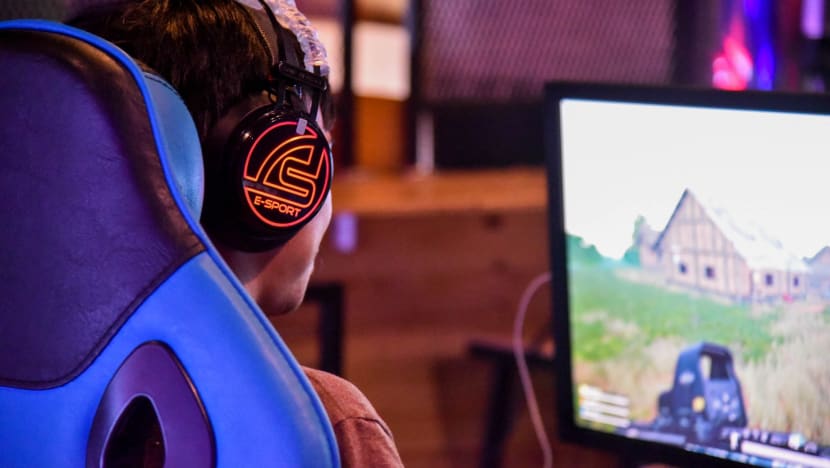
Southeast Asia has been keen to embrace the phenomenon: In 2019, for the first time, medals will be up for grabs for e-sports athletes at the region’s showcase sporting event, the SEA Games.
Governments have been quick to elevate video gaming competitions accordingly, alongside traditional sports. Thailand did so in July 2017 and since then tournaments have regularly been held inside schools and universities.
Suddenly, game companies have seen their products given legitimacy. An activity once done in the shadows in the days of bedroom computing has exploded into the mainstream.
“E-sports is a modern day gold rush. Just look at the revenues and it’s obvious that people are going to follow where the money goes,” said Cam Adair, a video game addiction expert, public speaker and mental health advocate.
Away from the elite playing circles, it is in fast-opening consumer markets where gaming has fundamentally changed even further. Since the release of the iPhone, the industry has surged in the direction of social gaming, reshaping revenue models, playing styles and categories as well as the very notion of who might be considered a gamer.
An entire generation of children has been caught in the dragnet. Alongside opportunity for some has come addiction for many.
LISTEN: The lucrative world of e-sports
BATTLE ROYALE
Cam Adair almost lost his life to video games. What had started as a fun release took a dark turn as a teenager as he retreated further into gaming as an escape from daily struggles.
“I could do it for 15 hours straight and not even think about it. Trying to get me to do a chore at home was World War 3. I had no interest in school, had no interest in getting a job and was gaming all day, every day. Obviously it got to a point where it was a really serious situation,” he said.
Eventually I wrote a suicide note and that’s when I realised I needed to make a change.
The 30-year-old Canadian is now on the front line of a rising regional and global crisis. After giving up gaming he has becoming a leading voice in providing help and information to others like him. Recognising a lack of resources, he started the Game Quitters website, the word's largest online support network for gamers.
“For me, when I searched online for help, I didn’t find any. And to be frank, it pissed me off,” he said.
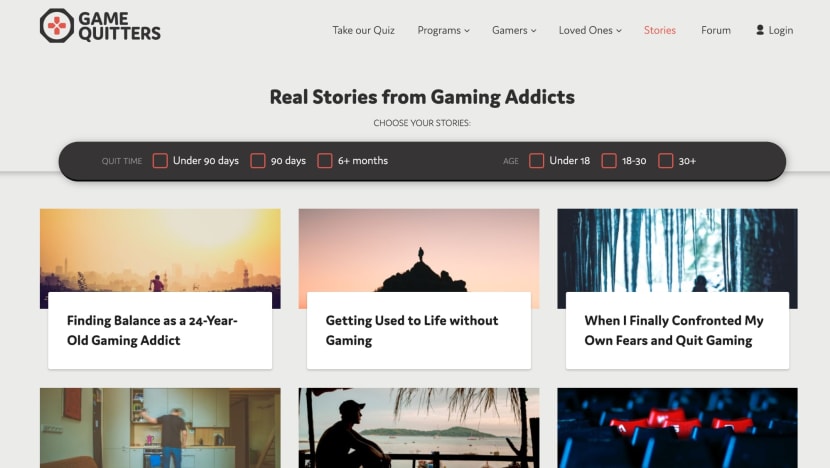
He believes there are millions of problem gamers around the world, an assertion backed up by the World Health Organisation, which recognised gaming addiction as a mental health condition for the first time in 2018.
In Southeast Asia, the problems of addiction are pronounced and the symptoms are worrying.
Since the classification of e-sports by the Thai government, the number of children seeking treatment at psychiatric units around the country has increased sevenfold, according to Dr Yongyud Wongpiromsan, an advisor at Thailand’s Department of Mental Health.
He estimates that there could be more than 100,000 children now addicted to video games in the country. That number does not include those aged 18 years and over, one of the biggest and most at risk groups of dedicated players.

In Thailand, children have an average of 35 hours of screen time, purely for entertainment purposes, every week, based on data from the country’s Ministry of Digital Economy and Society. Among 8 to 12-year-olds, 98 per cent used social media, 73 per cent owned their own personal phone and about half were playing video games.
“It blows my mind. That’s absolutely staggering. But it doesn’t surprise me at all once you spend time in Thailand,” Adair said.
“I saw someone in Chiang Mai using seven phones at once to play Pokemon Go. You wouldn’t see that in America. There’s definitely a different way that people relate to phones and technology here,” he said.
Dr Yongyud says the lasting impacts of screen technology exposure on young brains are completely unknown. But behavioural issues are already becoming apparent and he is among other health experts concerned about a possible epidemic within two decades.
“From early childhood it becomes an obstacle to the development of concentration and language development. And they play alone. They need not to talk to anyone. They have delays in language, social and then attention and concentration,” he said.
“When they become adolescents, the problems will become worse.”
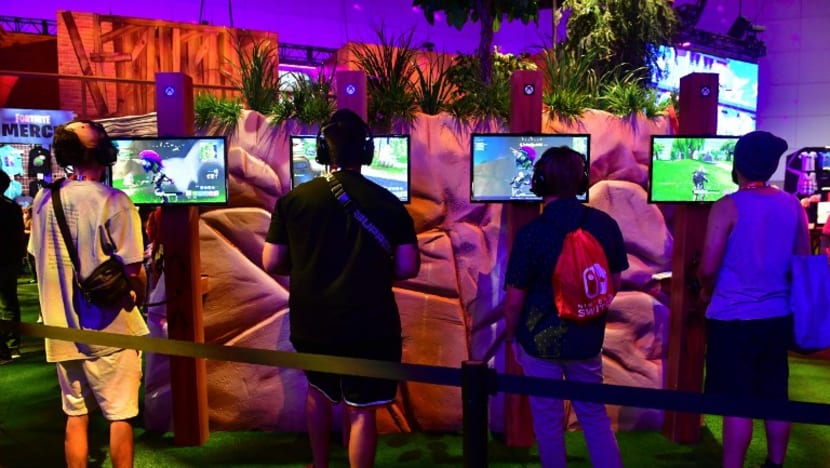
READ: Why is screen time bad for you? Scientists are still trying to find out
1-UP
It is in a resort surrounded by lush forest that some gaming addicts may now find themselves. Swimming pools, state-of-the-art gym training, catered meals, meditation and wilderness await those who can afford to pay their way to improved health in luxurious surrounds.
The Edge in Chiang Mai in Thailand’s north promises top of the line experiential treatment, specifically for 18- to 26-year-old addicts of various kinds.
Its staff estimate about 15 per cent of the clientele are receiving help for gaming addiction, and a majority of those are from Asia, including Singapore, Hong Kong, Malaysia and Thailand. The tailored program for gamers lasts for three months and costs close to US$50,000.
It provides a 40-day digital detox that otherwise would be near impossible in the outside world. The program is designed to remove triggers for damaging behaviour and instead encourages genuine human connection and community.

Addiction is a brain disease, explained John Logan, the head counsellor at The Edge, “not a moral weakness or a choice”, and he and his staff look to replace unhealthy dopamine - the chemical in the brain involved in reward and motivation - with a natural source such as intense physical exercise.
“Gamers might be locked in their rooms for months or even years and the only relationship they have is with their computer screen,” he said, describing the typical client as a member of the “failure to launch generation”.
What gaming does is it provides the myth of a sense of purpose because there’s measurable growth. It provides a sense of social involvement, which it doesn’t actually deliver.
The hallmarks of addiction - lying, cheating and stealing - are eroded away as participants learn to have a healthier relationship with technology. Often, Logan says, young men have been sent to The Edge by their parents and struggle for weeks to accept new boundaries being set for their lives.
“The temptations are very difficult to overcome. You can’t suddenly switch meaning, purpose and connection on with a tap,” he said.
READ: Too much screen time tied to school problems even in little kids

FOG OF WAR
Among gaming circles, the risks and signs of addiction are no big secret. And gamers themselves typically do not deny the facts: Addiction is common and is on the rise.
“Every gamer knows someone who games too much. It might even be themselves,” Adair said.
Nopparut Hempamorn is a serious gamer - and a talented one. The 22-year-old is currently ranked eleventh in the world at Tekken 7, a fighting video game and long-running franchise. Book, as he is known, travels overseas regularly to participate in tournaments with significant prize money and is often sponsored to appear.
He feels that his own gaming habits are now under control but remembers days when the situation was different, of hours and hours standing in arcades and department stores until they closed, leaving him to beg for more time.
“Sometimes because the game was so fun, it made me forget everything. And when you are so deep into the game, you don’t even drink. I didn’t feel the need to go to the toilet. And I didn’t even feel hungry.
“I think it's an addiction.”
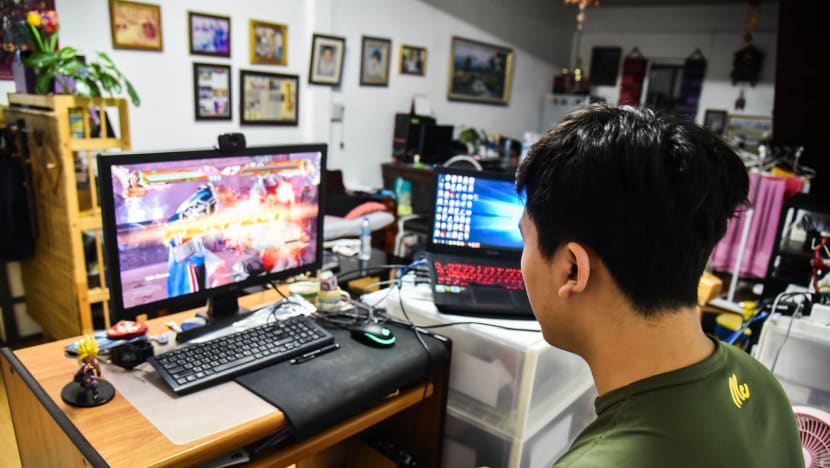
His reasoning for playing so obsessively is similar to Adair’s, and undoubtedly millions of others. Gaming provided an escape, even if it still left him lonely.
“I don’t have a lot of friends and I am not good at socialising. I feel that I struggle to make friends and to make contact. So, I chose to play games so that I can play alone because at the end of the day, it’s all about me playing.”
He says it is common to see his competitors battling with mental health issues or failing to see to the risks of their behaviour. He describes other players with “crazy eyes” or “yelling loudly”.
For most Thais though, seeking treatment first means acceptance, and then relying on the public health system, in which the notion of treating video game disorder is still not fully understood. Dr Yongyud says the country has a strong program for drug rehabilitation and those resources should be tapped to tackle the rising wave of gaming addictions.
He says it was “astonishing” when e-sports were recognised by the Thai government and he has called on a review of that decision. He also wants to see the gaming industry take a greater responsibility over harm prevention.
He has been labelled a “dinosaur” by netizens over his calls to regulate the industry but rejects notions his department is set on trying to ban video games or their competitions.
“Blaming us is a warning sign that we need to make young people and parents understand,” Dr Yongyud said.
“It’s the same situation as the control of alcohol and tobacco. They are not outlawed, so everyone can still use them. But we control the advertising, we control the price and so on. And we should have a sin tax so 2 percent of the revenue must go to organisations that control the negative impacts.”
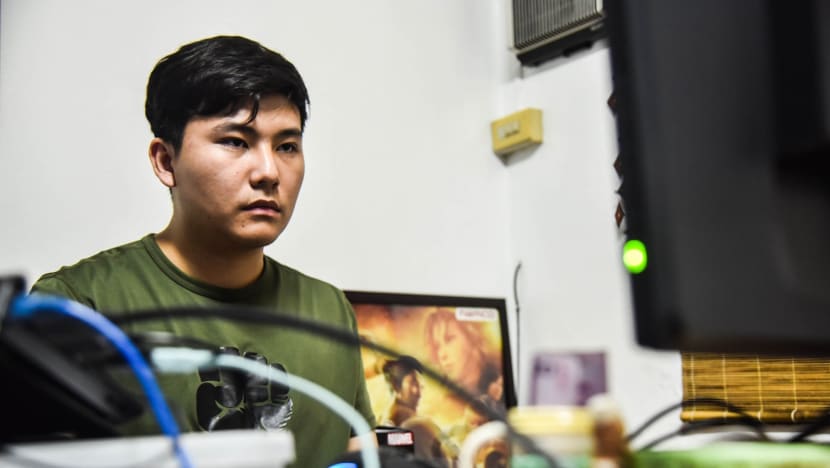
LOOT BOX
At a time of great upheaval on the economic side of the gaming industry, experts say it is proving difficult to keep up with changes.
Monster global sensations like the online game Fortnite have seemingly forever changed the business models of developers. Its creators have been aggressive in integrating the ability to make purchases within the game, triggering something akin to “sneaker culture”, according to Adair.
READ: US adults are spending big on video games, playing mostly on smartphones
More than 200 million players are registered for Fortnite, and many of them children obsessed with keeping up with cosmetic changes in the game, such as character’s outfits, equipment and dances, which come at the cost of real dollars.
The game generated about US$2.4 billion in digital revenue in 2018, according to SuperData research, the most annual revenue of any game in history.

The realities of the compulsion to buy are starting to hit hard among many parents of hooked gamers. Adair’s advice to them has never been in more demand; the “horror stories” never more prevalent.
“I recently spoke to a family. They have a 12-year-old who cannot play Fortnite without needing to spend money,” he said.
“This boy would literally sneak into his parents’ room at night to try and take their phone, open the email app and delete the notifications that he had spent money on their credit card,” Adair said.
For that family, that’s a huge red flag. Their innocent, nice child has transformed into one that’s completely deceiving them and trying to steal.
Adair also wants governments to institute protections for gamers. But in Thailand, figuring out who will take responsibility for the issues is a mission in itself.
BEAT ‘EM UP
Santi Lorthong is the proud president of Thailand E-Sports Federation, the governing body for the country’s video game athletes.
The federation is still in its early days, having been swiftly approved and recognised following an “urgent agenda” issued by Thai sporting authorities in late 2017 - e-sports would be an exhibition event at the Asian Games in Indonesia the following year.
Currently, the federation represents only 30-40 athletes, due to its strict conditions on who is approved for membership. Athletes must, for example, pass stimulant and health tests, show commitment, respect and be strong role models in society.

Lorthong is a passionate defender of the burgeoning sport and feels the body has become the target of criticism when it is the entire sector that needs reform and overhaul. He says it is the business side of the industry that is exploiting loose regulations. The nature of the games themselves, whether they be addictive or violent in nature, is not the main issue, he argues.
“This was like when Thailand had cars for the first time. People drove everywhere and crashed into each other because there were no rules,” he said. “I think the problem will never be solved because they are hacking the leaves instead of solving the problem at the roots.”
The Sports Authority of Thailand (SAT) says it is the federation’s duty to come up with rules and regulations for youth participation in e-sports. At the same time that some experts are calling for a ban on players aged under 18 in sanctioned tournaments, Lorthong admits that 70 per cent of the active gaming community is under 17.
With hundreds of tournaments being played every month, there is a significant challenge in implementing controls. Indeed, only a fraction of participants are members of the federation and most will never make it to the professional ranks.
“We are trying to solve this problem. We are worried about them. We just think that this sport can be excellent for our youths,” said Witsanu Laichapit, Director of Development of SAT’s Sports for Excellence Department.
Regardless of the concerns, the possibility of brighter and more competitive opportunities for e-sports players has the industry in Thailand abuzz. Even Cam Adair is a strong advocate for the development of professional e-sports. But with the health of hundreds of thousands of young people in Thailand alone at risk, he hopes changes will be introduced by the industry’s big stakeholders.
And for individuals, pressing pause for a while could prove to be useful advice. “I think addiction is very isolating, you feel alone, very misunderstood, but it’s not true,” Adair said.
“Asking for help is what ultimately saved my life and could potentially save yours. It’s really important.”














